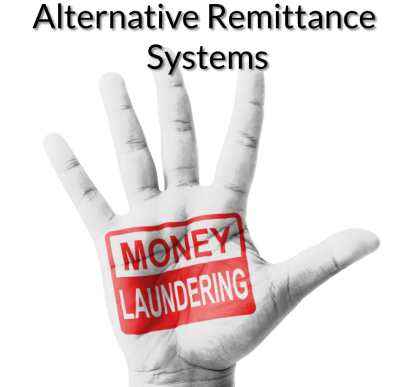Conventionally, money is remitted between people and businesses through banks or financial institutions. Your pay packet, for example, may be remitted from your employer’s bank account to your bank account on a weekly, fortnightly or monthly basis. Should you choose to spend some of your pay packet on goods or services by using your credit card, money will be remitted from your bank account to the vendor through a financial institution. Other examples are readily identifiable: paying rent and bills through a bank transfer, remitting money into a savings account or remitting money to a loved one through a bank transfer as a gift.
An alternative remittance system is one that operates outside conventional remittance systems. Some alternative remittance systems have operated for hundreds of years, and many are legal and legitimate in countries all over the globe. Hawala is an illustrative example; money is not remitted through promissory notes, but through a network of brokers bound by an honour system. Hawala and similar systems are often used by migrant workers to remit money to relatives or friends in countries where the financial sector or other factors may make remittance through conventional systems impractical.
Alternative remittance systems are of great interest to law enforcement bodies and financial regulators because of the risks associated with their misuse.
The Australian Transaction Reports and Analysis Centre (AUSTRAC) is Australia’s anti-money laundering and counter-terrorism financing regulator. AUSTRAC’s aim is to work with industry to harden the financial sector against penetration from organised crime, terrorists or their sympathisers.
In a recent law enforcement investigation, AUSTRAC provided financial information concerning a remittance company suspected of laundering money for criminal syndicates. The company had reported sending AUD $6 million to Iran and Iraq on behalf of legitimate customers. However, a comparison of reports generated by banks that had dealt with the remittance business as a customer showed that the company had only sent $3.66 million, resulting in a shortfall of $2.34 million. Additionally, bank data showed that the company had made significant cash deposits totalling $3.14 million. Ultimately, the director of the remittance company was charged and pleaded guilty to dealing with money reasonably suspected to be the proceeds of crime.
The above example illustrates that money laundering offences can often involve multiple jurisdictions, each with distinct systems of law. An individual charged with a money laundering offence will inevitably ask “Which law or laws apply?” The next question may be “Am I being investigated overseas for this offence?” and then “Am I facing potential extradition“? In these instances, it is essential that you have an experienced criminal defence lawyer on your side who understands the procedural and legal framework within which transnational crime can be legally investigated.
Nyman Gibson Miralis provides expert advice and representation to individuals and companies under investigation in Australia and abroad. We are experienced in advising in cases with a transnational criminal law component involving the U.S., Canada, the U.K., the E.U, China, Hong Kong, Singapore, Taiwan, Macau, Vietnam, Cambodia, Russia, Mexico, South Korea, British Virgin Islands, New Zealand and South Africa.



